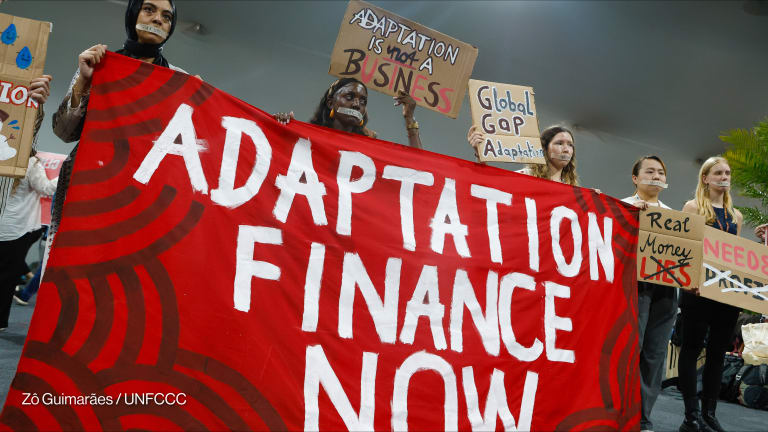Development finance trends to watch in 2022
What does the year hold for development finance? The experts tell us to keep an eye on efforts to finance a transition to net-zero emissions, a push around corporate disclosures, more accountability, and a number of instruments likely to see a boost.
Last year, there was an increase in private sector commitments to addressing climate change, and 2022 appears poised to be focused on accountability and measurement of those commitments and how they might push development finance institutions to adjust their own work. The growing number of net-zero commitments, climate finance, and SDG investments last year created “growing skepticism, distrust and cynicism about what is actually happening” and whether funding is flowing to those who need it, said Amit Bouri, CEO at Global Impact Investing Alliance. So this year will see “a big shift from pledges to a focus on performance,” he said. That means companies and investors should operationalize pledges and boost their alignment on standards — either through voluntary mechanisms or regulation — in a way that drives progress on the sustainable development goals and the Paris Agreement climate targets, Bouri said. Development finance experts tell Devex that enhancing environmental, social, and governance standards; requiring more corporate disclosure; and financing the transition to net-zero emissions of greenhouse gasses are all worth watching this year. So are a handful of instruments — bonds, guarantees, and blended finance. Net-zero Financing a transition to net-zero will be a “huge issue” in the year ahead, with a focus on defining what it is and how it will occur, said Marcos Neto, director of the finance sector hub at the United Nations Development Programme. That means continued debates about what should count as climate or transition finance — especially whether gas should be considered, which has been an issue recently in the EU and for African countries in particular. African countries are home to the greatest number of people who still lack access to energy, and many on the continent believe that they should be allowed to use gas as a transitional fuel as they look to expand access and economic growth. “My fear is that we embark on the transition conversation in a very structured, very stationary way; I think we need to look at transition financing as a dynamic flow,” Neto said, adding that there should be timelines for what is acceptable that vary by sector and country, with more aggressive restrictions in advanced markets. While companies made many commitments last year — through the Glasgow Financial Alliance for Net Zero, or GFANZ, the Net Zero Asset Owners Alliance, and other avenues — most of the leaders who made them will be long gone by the time they’re intended to be fulfilled, Bouri said. So defining those commitments and then operationalizing them will be critical. Corporate impact disclosure All signs point to the potential for this to be a pivotal moment when it comes to disclosure and standards on ESG investing, as well as climate impact. Movement seems to be afoot, with Europe pushing forward with its regulations, discussions about the U.S. Securities and Exchange Commission mandating disclosure on climate impact, and the creation of the International Sustainability Standards Board, which aims to create comprehensive sustainability-related disclosure standards. “It won’t be easy to be a development bank in 2022. The scrutiny, tension on them will be a lot more than before.” --— Nadia Nikolova, lead portfolio manager, Allianz Global Investors “There is a lot of buzz around disclosure. The question is, is it going to become mandatory fast enough?” Neto said. The “real game changer” will be regulation that makes disclosure mandatory, but in a “dynamic way” that allows for a periodic review of standards, he said. These disclosure efforts matter because existing ESG standards often allow arbitrary determinations about what contributes to a company’s ESG rating. An example of this is how MSCI Inc., the largest ESG ratings company, upgraded McDonald’s rating last year, saying it was on the basis of the company’s environmental practices. It did this after deciding to drop carbon emissions from the calculation of McDonald’s rating, despite it being one of the world’s largest beef purchasers and generating “more greenhouse gas emissions in 2019 than the entire country of Portugal” because of its supply chain, as Bloomberg reported. If these efforts at standardization succeed, it could stop the proliferation of different sets of metrics, reduce confusion, and improve accountability, said Brian Moynihan, CEO at Bank of America, at a recent World Economic Forum event. He said now is the time to take action on environmental change and other global issues, rather than continuing to debate about how to measure. The key questions are how far potential regulations or disclosure requirements go and what gets codified, he said. The type of ESG that has the most momentum is ESG through the lens of risk mitigation — how performance on environmental or social factors pose risks to companies and could impact their financial performance. “That’s not the same as trying to achieve a specific focus,” he said. Accountability for actions Proper standards and disclosure can better enable accountability for private companies, and that is also expected to be a focus this year, development experts told Devex. The G-20 sustainable finance working group will be looking to enhance private sector integrity, especially when it comes to their pledges, such as through the GFANZ, Neto said. The working group will make recommendations for private sector pledges and what could be a long-term monitoring system for those pledges, he said. But it won’t only be the private sector that sees some extra scrutiny — development finance institutions are likely to feel the pressure too. “It won’t be easy to be a development bank in 2022. The scrutiny, tension on them will be a lot more than before,” said Nadia Nikolova, who manages the development finance portfolio at Allianz Global Investors. She added that how they respond and whether they pivot or compete with commercial finance is a key question. Nikolova expects that the private sector and asset owners are likely to push development banks this year, a reversal of how the dialogue on these issues often worked in previous years. “I wouldn’t be surprised if 2022 is the year we start seeing private sector representation at development banks, on investment committees or boards,” she said. “I’m hoping that the impatience of private capital is going to try to speed things up.” Blended finance, bonds, and guarantees The green bond market is expected to grow and could hit $1 trillion this year, according to Climate Bonds Market Intelligence. But the sustainability, SDG, and social bonds markets are also growing — up about 50% in 2021 compared to 2020, according to Climate Bonds. UNDP, which has been involved in SDG bonds, has seen tremendous interest and expects to help do more of those transactions this year, Neto said. Several development finance experts also told Devex that guarantees will continue to be important, whether it’s in helping support bonds in lower-income countries, or otherwise helping de-risk transactions and mobilize additional private investment. Blended finance dipped as a result of the pandemic — dropping nearly 50% in 2020 from the previous year — but it is expected to stabilize this year. And the chorus of people calling for more use of the tool has grown and now includes BlackRock CEO Larry Fink, who called for donors to provide $100 billion in grants or subsidies to mobilize about $1 trillion in spending to reduce emissions. Institutional investors showed up last year by making commitments to net-zero, but they didn’t “have the strength or speed of response from the development actors” they thought they would get, said Joan Larrea, CEO at Convergence, a global network for blended finance. Institutional investors need scale, so this year they may take part in large debt-style blended finance transactions, likely in climate-adjacent issues, Larrea said. “Don’t expect big money to instantly do small private equity in the impact world. You have to serve them up things that look really familiar but are one degree off,” she said. That means sovereign debt with green features, sustainability bonds, corporate bonds that have ESG features, or other instruments that can be traded are likely to be more popular. Development banks are the largest conduit to concessional capital, Larrea said, and they need to be more upfront with how they’re willing to contribute to blended finance deals and on what terms. And when they do put money into a deal, they should make clear that they are looking for specific impacts and require reporting, she added. Governments have proven through different programs — such as the U.S. Defense Advanced Research Projects Agency — that they’re willing to take risks, she said, adding that she’s not proposing they take that level of risk with aid but that they set aside a small amount of “ring fenced public aid money.” If they do so, they “can do something that has more of that spirit of ‘got to break the mold,’ and figure out how to help people in real time and at scale.”
Last year, there was an increase in private sector commitments to addressing climate change, and 2022 appears poised to be focused on accountability and measurement of those commitments and how they might push development finance institutions to adjust their own work.
The growing number of net-zero commitments, climate finance, and SDG investments last year created “growing skepticism, distrust and cynicism about what is actually happening” and whether funding is flowing to those who need it, said Amit Bouri, CEO at Global Impact Investing Alliance.
So this year will see “a big shift from pledges to a focus on performance,” he said. That means companies and investors should operationalize pledges and boost their alignment on standards — either through voluntary mechanisms or regulation — in a way that drives progress on the sustainable development goals and the Paris Agreement climate targets, Bouri said.
This story is forDevex Promembers
Unlock this story now with a 15-day free trial of Devex Pro.
With a Devex Pro subscription you'll get access to deeper analysis and exclusive insights from our reporters and analysts.
Start my free trialRequest a group subscription Printing articles to share with others is a breach of our terms and conditions and copyright policy. Please use the sharing options on the left side of the article. Devex Pro members may share up to 10 articles per month using the Pro share tool ( ).
Adva Saldinger is a Senior Reporter at Devex where she covers development finance, as well as U.S. foreign aid policy. Adva explores the role the private sector and private capital play in development and authors the weekly Devex Invested newsletter bringing the latest news on the role of business and finance in addressing global challenges. A journalist with more than 10 years of experience, she has worked at several newspapers in the U.S. and lived in both Ghana and South Africa.








